#he's so used to humans being scared or playing valiant hero against him
Text
Dracula 99% of the time: What’s up, mortals, I’m here to drink and terrorize you
Everyone: D:>
Dracula going to the zoo: Hello, Mr. Zookeeper, I like your wolves :)
Thomas ‘Gives -10 Shits About Rancid Vampire Vibes’ Bilder: Fuck off
#NOTE: We're going to see in a much later chapter that Dracula is weirdly flummoxed by one thing beyond garlic blossoms and crosses#and that thing is surly workers whose flight or fight response to fear was replaced by the 'Fuck Off' response#I wonder if it honestly just baffles him out of doing violence#he's so used to humans being scared or playing valiant hero against him#he has no idea how to deal with wholly average crass folks telling him off#kind of love it#dracula#thomas bilder#dracula daily
2K notes
·
View notes
Text
Golden hearted
Chapter 1/6
A/N: So I’ve been reading a lot of villain centered books lately :)) and thought it would be fun the make the oc a bad, bad girl. It was more difficult than I expected thought, gotta be real :))
That being said, this is probably very ooc, but hey, I’m writing it for fun. May be a tad attraction at first sight-y, just a little bit :P
Will lead up to Endgame ^^
Aesthetics relax me!
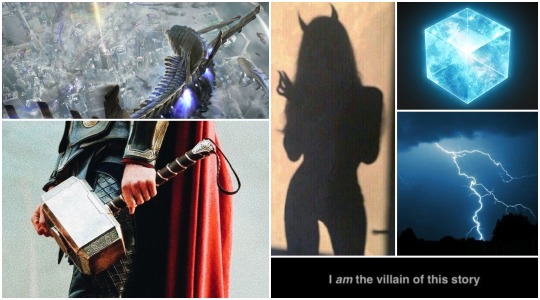
The Avengers were reunited for a second time, the circumstances better than first time, but still with a problem on hand. They were gathered around a table in the same room they apprehended Loki, but all new furniture and equipment and a fully repaired wall. The Iron Man pressed a few buttons on his weird midgardian tablet and her image shot up in front of them, detailed writings underneath. Stark read out loud, annoyance clear in his voice.
"You guys remember her. Name: Evelyn Evans. Powers include: superhuman strength and resistance, flight, turning things into gold. That last one is new. Weaknesses: try blasting her head off. Who filled this in? Someone tell Fury that's more a recommendation than an actual weakness."
Thor was silently looking at the woman's face. He remembered her well despite the picture being taken before she acquired her powers: a bashful look, almost as if the camera scared her, with big dark rimmed glasses and hair pulled up in a tight bun. The white shirt was the only visible clothing, but it was a far cry from the lacy dark blouse and generous low cut V neck she had when they met. He could picture her in his mind as if it all happened just that morning.
The chitauri army was pouring through the giant portal in the sky. She stood out, alone in the middle of the street, most of the humans having ran as far away as possible at the first sight of the monsters and giant portal in the sky. Like the valiant man he was, he rushed to save the damsel in distress. He was beyond surprised when the said damsel punched one of the chitauri soldiers and became even more curious when she floated a few inches off the ground and punched a few others. Her attention snapped to him soon after, her dark hair flowing as she glided closer. She looked him up and down, her expression bored as if it were just another day on Earth.
"I assume you know what's going on here?"
"The chitauri army is invading." She furrowed her brows, arms crossed. She was still a few inches off the ground, almost at eye level with him and he had to admit she had quite the mesmerizing eyes, light brown, with little wisps of golden yellow. Such a silly thing to notice while aliens were closing in.
"Well that explains a lot... Any idea how to stop this?"
"We have to find my brother, we have a plan, but we need his weapon." She sighed long and hard, looking more annoyed than anything else. She seemed to consider something, looking at the chitauri forces and then back at him again.
"Okay big guy. I'll stick around, you point me at the bastard when you see him."
"He's not a bastard, he's adopted!" That was when she first smiled, shacking her head with a little chuckle. She look him over once more, a shadow playing behind those eyes and sly grin. Thor felt a pang of guilt for actually enjoying the predatory gaze she was giving him. He made a mental note to visit Jane after they save Earth from his brother.
"Got a name, funny guy?"
Chitauri soldiers swarmed them before he got to answer. He was impressed at the woman's agility and endurance as she fought with him side by side. He threw his hammer at a creature that was sneaking behind her, Mijolnir landing some feet in front of her. He remembered her frown when she couldn't lift it and the smirk when he called the hammer back into his hand. Such a hypnotic smile, eyes sharp and determinate, as if it she had found a challenge she would enjoy conquering. They found each other back to back, chitauri focusing on them.
"My name is Thor. What shall I call you, my lady?" She looked at him, amusement written all over her face as she caught a chitauri by the throat and crushed it. He almost gasped at the display, more so because she looked so unaffected. He assumes she was just another powered human, another one of Earth’s mightiest heroes. He would have never guessed she would turn out to be a villain instead.
"The Norse god of thunder?"
"In the flesh!"
"And I suppose this brother we're looking for is named Loki?"
"You've heard of us!"
"And when I thought this day wasn't going to get any more interesting..." She punched another creature just as he took out the rest with his hammer. When they were done, she turned towards him, hand extended and despite all the strength behind her punches, her skin felt soft against his. "Evelyn. Nice too meet you Thor, God of Thunder." She said his name in a way like no other, half praise, half dare, as if she acknowledged his status but thought she could still take him nonetheless. He lifted her hand and kissed her knuckles without thought, the gesture registering only after his lips touched her skin.
"The pleasure is all mine, lady Evelyn." She flashed him another toothy grin, stealing another glance at his hammer and letting her hand slide painfully slow from his. She was doing things to him and perhaps if he weren't so entranced he would have realized she was nothing but trouble. But the red flag came later, after the portal had been closed and his brother in their grasps.
"So you're the God of Mischief." She circled him like a hungry predator, the wolfish smirk on par with the ones his dear brother used to flash. "Too bad. We could have had some fun together, you and I."
"Release me and maybe I'll allow you to rule by my side." She scoffed, looking offended, but smiled at the same time.
"Something tells me you're not worth all that trouble. Besides..." She leaned in to whisper at his ear, but loud enough that Thor had heard it. "The world is already at my feet."
She looked the part as she said those words, mischief in her eyes and wicked tongue. Thor played it as bravado, mixed with a flirty personality at the time. In hindsight, he should have noticed the act, years upon years spent with a trickster in the family. But as those doe like eyes turned on him, he could only see the rose and not the thorns beneath.
"Well it's been fun and all, but I'll be going back to my vacation." She turned towards Thor, all sweet and alluring, catching him off guard. "Unless you want to have some fun, God of Thunder."
"I'm sorry lady Evelyn-"
"You're already taken, figures. Well if it doesn't work out, come find me." She winked at him and took off through the gap in the wall, her voice etched into his memory until Tony's broke the silence.
"Guys, where is the Tesseract?"
"That little thief!"
Thor shook his head, taking a deep breath and stealing one more glance at the floating picture. What was done was done and there was nothing he could do to change the past. Instead, he should focus on the future. They had been looking for her since that day, almost 2 months ago. The woman was like a ghost, appearing one place in a second, then halfway across the world the next. And that was when they traced her at all. The sad truth was they had no idea where she was most on the time.
"How did you find her?"
"So she kicked some mafioso out of his mansion and killed a few of his goons. Been living there for a few days." Thor's heart sank. She hadn't really done anythingparticularly nefarious after stealing the Tesseract. Mostly visiting places on Earth and booking hotels. There had even been proof that she helped a family out of being evicted, the odd shaped gold pieces being traced back to her powers. But now she was taking lives. How could he still hope there was some good in her as well?
"When has she gotten so out of control?"
"She's always been out of control. She stole the damn Tesseract."
"But she helped during the battle in New York." He couldn't deny there was still some unrealistic hope that the woman was not at fault. Yet there was no other explanation for the disappearance of the Tesseract and it also explained how she was traveling from one place to the next instantaneously.
"From what I understood she was caught in the crossfire. It wasn't exactly the rushing to our aid type of thing." Natasha added in her usual unimpressed voice. Thor regarded her for a moment, her frame small in the black leather chair. She didn't look it, but the Black Widow was also capable and dangerous.
"Hm. She seemed like a nice kid back then." Tony's remark made several of the Avengers turn to him with questioning looks, but Thor changed the subject. He was eager to solve this mess and return the Space Stone back in Asgard's vault were it belonged.
"So what do we know about her?" Natasha flipped a document open, but she didn't need to read any of the words, the information already read and analyzed, if she hadn't been the one to gather it in the first place.
"Nothing much. She was a science major, a bit antisocial if you ask me. Teachers and colleagues had only nice things to say about her, she learned well, was well spoken and helped whenever she could. Had a lot of acquaintances, but no real friends though. She stopped attending classes just a few weeks before New York. No previous sings of powers, so we assume that's when she got them."
"No family?"
"Raised by a single mother. Died about two years before she dropped out."
"And these powers, do we know how she got them?"
"No clue, but I'm sure Fury knows more than he's letting on. He's been kind of shady about the whole thing." There was a long silence as everything sank in. They basically knew nothing about her, or the extent of her powers. Since when did she turn things to gold? But she was far from indestructible, the cut on her arm from a chitauri spear fresh in his memory. Tony spoke first after a moment.
"I'm going to be sitting this one out. Banner as well"
"What? Why?"
"I am a busy man, Captain. And I'm pretty sure Goldilocks here can take her alone."
"What could be more important than the Tesseract?" Natasha interest was clearly peaked, her sharp gaze studying Tony's every gesture, but it was Banner who spoke, full of a childlike enthusiasm.
"We've encrypted a code from the stone in Loki's scepter. It's truly amazing, like nothing I've ever seen."
"We're saving the world on a different front guys. Have fun with our little thief."
The two left the room, not before Stark changed the picture of Evelyn with a map and coordinates. The captain let out an exasperated sigh and stood up, looking at them in turn, assessing the unexpected change in plans. Him, Thor, Natasha and Clint had to be enough.
"Alright, we got one shot at this before she uses the Tesseract and we loose her again." Somehow Thor doubted she was going to run this time.
Chapter 2 >
9 notes
·
View notes
Text
My upbringing was starkly black and white, everything strictly categorised as sin and acceptable, allowed and not. The massive ‘sin: not allowed’ category swallowed everything in legalism and immutable consequences. I fell in love with noir partly because it has no such hangups.
I savoured noir’s evocative language and sexual undercurrent. I learned to believe exposing repressive authority and dirty deeds was valiant even if ultimately futile, and justice could be delivered even when corrupt systems stymied it. The hardboiled detective attracted me from every angle, and I dreamed of both being and fucking the daring mystery-solving, smoking, drinking, dame-bedding wiseass. The detective archetype is dangerously appealing; stalwart antiheroes holding to their personal code while all around them people sold their souls for a bottle of scotch, a land deed, a tempting woman or a hard man. Terribly tragic, and as such, terribly romantic.
Like a suspect in a smoky dive bar, what constitutes ‘loyalty’ in noir is hard to pin down, but while most supporting characters treat loyalty as a purchasable, expendable, flexible commodity, [anti]heroes Spade and Archer, Gittes and Dewitt, Mars and Hammer, et al. hold fiercely to their personal definitions thereof. These ideals often keep them from working with a partner, as they can’t find others who share their notions longer than a book’s opening chapters, a film’s first act. Sometimes, in a twisted blessing, their partner gets murdered before committing betrayal. (‘Committing betrayal.’ What a cruel grammatical construction.)
Fairly unique among their set, Charleses Nick and Nora manage loyalty and happiness to and with each other, but not only does their teasing openly relay insecurities in everyone outside their connubial circle, their origin story is shot through with loyalty conundrums. The crux of The Thin Man revolves around characters leveraging Nick’s allegiance to an old friend to make Nick and Nora investigate a suspicious death/disappearance, similar to the relationship between Marlowe and Terry Lennox in The Long Goodbye.
Marlowe: You didn’t have much choice, huh? So you used me.
Lennox: Hell, that’s what friends are for.
Many noir tales examine murder, corruption, lost love, incest, power, grasping for companionship in sex and booze and partners. Few are so nakedly about friendship, loyalty, and the unique betrayal they set you up for as The Long Goodbye. As the game Lennox and Marlowe play in their first scene tells us, all Marlowe’s relationships are games of liar’s poker he’ll lose. The only question is: sooner, or later?
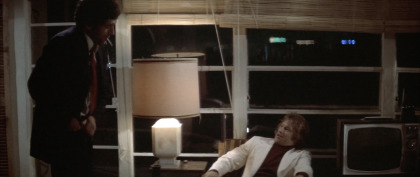

The film’s opening involves the great Philip Marlowe cajoling his hungry cat to eat first a concoction of cottage cheese and raw egg, then generic cat food. The two mewl, mumble and scratch in their understanding standoff. The film ends with Marlowe coolly justifying shooting his once-friend because Lennox indirectly killed the cat. Everything between is a meditation on loyalty.
As best exemplified in Nick and Nora Charles, noir understands relationships featuring fidelity and comfortable insults are the ones which really matter, so the snarky–sweet caring–codependent way Marlowe and hungry cat banter intentionally evokes true friendship. Altman called that opener important and Marlowe’s relation to his cat commentary on friendship: no matter how hectic his life, Marlowe is concerned the cat eats, whether the cops scare him, if he’s lost in LA’s mean streets.
Like most of his genre, Marlowe is destined to traverse the criminal underworld, continually learning the hard way he’s more loyal to friends, clients, even his constantly stoned neighbours, than they to him. He can’t bring himself to act on his cynicism until he’s burnt, and is a lost soul not because he’s dumb or drugged – he turns down even his neighbours’ hash brownie – but because he can’t find anywhere to put his trust.
Though they harass him and he blusters against their threats and handcuffs, Marlowe’s relationship with the cops is his most stable. He despises their work, they hate and stymie him, but at least he knows where he stands. Everywhere else is shifting sand and empty promises, golden and glittering by daylight, cold and dangerous at night. Under it all play morphing renditions of “The Long Goodbye,” refrains evolving and fading as quickly as relationships, adding atmosphere as Los Angeles underworld characters succour the detective and each other until betrayal becomes convenient.
As he searches for answers in mysteries and others, Marlow smokes to dull the pain – take a shot every time he strikes his match on a new surface, you’ll be drunk before the halfway point. Elliot Gould’s physicality superbly conveys Marlowe’s hurt and insecurity, shambling gait literalising existentially unsure footing.
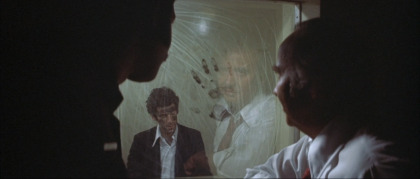
Altman’s shots and Zsigmond’s cinematography also expose Marlowe’s mental state. The beautiful police station tracking shot puts us in Marlowe’s gumshoes, showing his strain as he attempts to sort through the mountain of information, theories, and grief he’s been buried under. The long dolly across the grounds of the clinic has a similar effect, moving first methodically, then more frenetically as Marlowe’s frustration builds. Exposition of addresses and phone numbers unroll with slow camera movements over long takes, revelling in the acting’s stillness, taking a less usual route than montages to make the viewer feel Marlowe’s tedium and loneliness.
The odyssey is wrapped in perfectly exposed beach scenes, daytime sands yellow-tinged and California to their core, nighttime painted deep blacks and grainy red with Eileen’s dress the only spot of yellow. Doubled imagery and symbols of duplicity abound, the most striking of which involve the beach. First we see Marlowe in the glare off Wades’s window, projected between quarrelling lovers as they snipe at each other. Later, in the same window, Eileen is shown two-faced as she and Marlowe talk while her husband charges suicidally into the inky sea.

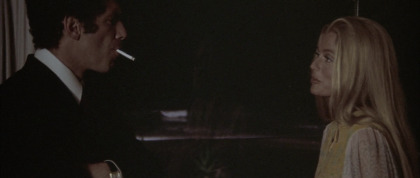
The whole film is a gorgeous depiction of our ugliest impulses, and Altman is the perfect director for it. Through various lenses and genres, Altman’s work examines intimacy and pain which can be leveraged by only those closest to us. Noir’s peripheral characters are who many of Altman’s other films center: desperate, impotent men; disloyal lovers; marriages on the verge; frustrated humans performing drastic acts. The Long Goodbye digs into side stories many noirs don’t unless impacting the protagonist directly: Farewell, My Lovely is more concerned with Marlowe’s relationship to the women in his path than the women themselves; American Gigolo hardly contains a conversation Julian Kaye isn’t in; Evelyn’s relationships in Chinatown mostly evolve when Jake is around to observe, and he’s around almost every frame. Some of The Long Goodbye’s more virulent events or breakdowns happen while Marlowe is out of the picture, or listening to nothing but crashing waves.
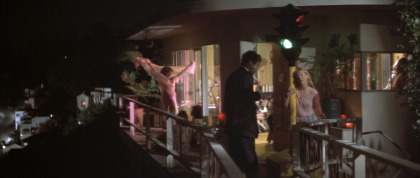
Altman is interested in examining these stories for their own sake, and shows it by examining side characters with the reflections motif, too. Zsigmond uses Eileen’s windshield brilliantly to reflect her facade as Marlowe chases her through the streets. The stoned hippy neighbours are introduced surrounded by floor-to-ceiling windows, one dancing with herself in the mirrored glass. The gate-guard-slash-impression-artist is reflected in Harry’s shiny car sidepanels, a symbol of security who pretends to be many other people, then shows himself more trustworthy than people pretending to be someone they’re not.
The guard also displays The Long Goodbye’s wicked sense of humour, along with the horny lookout whose ogling of stoned half-naked neighbour women allows Marlowe to sneak away. There’s the slapstick of Harry swinging haplessly on the gate trying clamber over as he imagines a detective should. Marlowe plants a sloppy handprint on the interrogation cell two-way mirror, then paints his face with fingerprint ink, cops impotent to stop his clowning. The guard dog fetching her owner’s stick from the waves has a twisted hilarity to it.
Which brings us, as the film continually does, back to loyalty. Relationships with animals are throughout: besides his cat, Marlowe nervously banters with the guard dog and talks as cheerfully as a damned man can to strays lying in the road. Ultimately animals’ loyalty – even only to the hand that feeds and then betrays them, pictured perfectly with mounted ducks – is still stronger than that of everyone else in his life, and loyalty is important to him.
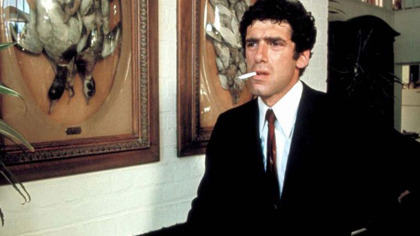
If only I’d recognised earlier how much my identifying with pulp heroes was due to my own sense of loyalty, deservedness of recipients be damned. “Their cynicism exactly stems from their compassion, [their] hardness is a scar tissue of a heart they can’t stop the world from breaking over and over.” I weirdly admired Marlowe hoping against hope, believing those he loves once, then again. You know what they say about fools.
Marlowe: Nobody cares but me.
Lennox: Well that’s you, Marlowe. You’ll never learn, you’re a born loser.
The Long Goodbye is Chandler’s most personal work. “You writers have your own special way of describing, don’t you?” is the movie acknowledging this sure as Chandler’s book commented on his deep insecurities, ideals, and philosophies. (The film references the book many times, including the face-bandaged man as a nod to Book Terry’s extensive plastic surgery.) Roger Ebert said in his original review, “The private eye as a fiction device was essentially a way to open doors; the best novels of Chandler and the others are simply hooks for a cynical morality.” Like Inherent Vice, the criminal underworld is alluring backdrop and murder the smaller mystery behind the real question of whether the detective can uphold his personal code in a world where ‘a man is only as good as his word’ simply means most men are no good. The real question, the crux and heart of the matter, is Will they keep clinging to that code? Why do we keep falling for those who throw us over?
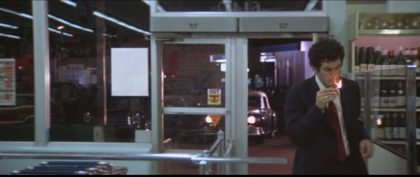
The thing about franchised noir detectives is, as characters or story properties, they can’t fundamentally change. They solve mysteries, their settings are updated from 50s to 70s to aughts to 2019, they jadedly swear they’ll never trust again, they may seem to learn their lesson. But in the end the stories reset. Sure as sunset and the next story, they get let down, used, double-crossed, stung, only to begin again when the next sultry shadow darkens their door. Once again they give their loyalties to a friend in need, a dame with legs up to there. Once again the dames and mates evaporate; or worse, explicitly sell our fallible hero upriver, relying on said hero’s tragically loyal personal code to prevent retaliation.
We’ve all had those dames and mates. We’ve all sworn to never love again, only to willingly set ourselves up for more heartbreak. People who mean what they say only so long as they feel like it. Family who love you so long as you’re meekly in line. Dames who say “I love you” in the night and “I’m leaving you” in the morning. Business partners who call you family until it’s more expedient not to be. Friends who say forever but mean for as long as you’re fun, and you’re no fun when you’re stumbling through a haze of pain or grief. Homme fatales who sell you out when a better offer comes in. Lovers who are loyal while you do exactly what they want.
In the first of two crucial scenes which start placidly before exploding into brutal violence, thug Marty gives a speech to/about his girlfriend Joanne. “Delicate and sweet . . . I love you. I do. . . . The single most important person in my life.” Ah, love, the highest form of loyalty.
Then he hits her across the face with a glass bottle.

Do we feel sorry for her? is the same question Tarantino asks in Once Upon A Time… In Hollywood when Brad Pitt’s Cliff smashes sadistic Sadie’s face with a can of dog food. The blow to Joanne’s face is lighter and unprovoked, but though her crimes are lighter, her madonna-like framing is window dressing. She blithely enjoys fruits of Marty’s torture, murder, and extortion, knowing her flippery is bought with blood money. (Her blow’s aftereffects are visually replicated by Jake’s bandages in Chinatown – directed by Polanski, who is depicted in Once Upon A Time, making these films a Möbius strip of themes, imagery, period, and settings.)
In different ways, Joanne and Sadie establish The Long Goodbye and Once Upon a Time‘s cruel worlds, where psychopaths and rich ruthless men get their way. Both center men with drinking and smoking habits, a dubious past, and a personal moral code. Marlowe and Cliff fight against the establishment, for themselves and their friends. Though they don’t believe in innocence, they want to believe people exist whose souls at least aren’t as dark as the rest of ours. Within their morality is loyalty; Cliff to Rick Dalton, Marlowe to Terry or at least the idea of him: “Terry Lenox was my friend you motherfucker . . . you don’t deserve to be alive you fuckin’ pig.” Rick and Terry don’t return the loyalty, yet Cliff and Marlowe can’t help themselves. It’s their code.
The Long Goodbye ending Ebert calls “off the wall” I see as wish fulfilment, same as Once’s. In the film Terry gets justice delivered by Marlowe, Bracket’s screenplay ‘fixing’ the book’s injustice. Altman revels in this playground where disloyalty equals death and real world consequences are momentarily suspended for a warped fairy tale ending.
The final shot is reminiscent of Holly Martins waiting on a tree-lined boulevard in The Third Man, another film featuring a man unendingly loyal to a death-faking friend who didn’t deserve such fidelity. The Long Goodbye’s last shot brings yellow in again, reminding us of Eileen’s dress, the faded sun on the beach, letters and pledges of friendship aged and brittled by time. Only here, Marlowe’s the one walking away, getting as happy an ending as one can hope for in noir.
This slideshow requires JavaScript.
Lennox blindsided Marlowe, then called him a fool for expecting others to do what he would in keeping his word. Pulp detectives are thrown under the bus or off a cliff with the shrugged excuse along the lines of “I knew you were tough enough to survive” or “sorry, you were just collateral damage.” Given enough time, “I threw you under the bus to save myself” becomes “It was the best option for both of us” becomes “you survived and are better for learning this lesson, you should be thanking me!” This essay draws parallels to Marlowe and Veronica Mars’ getting run over because of their clinging to loyalty, “an anchor that binds.”
But every detective also has their breaking point, the point at which they say the rules have been violated enough to justify them taking matters into their own hands.
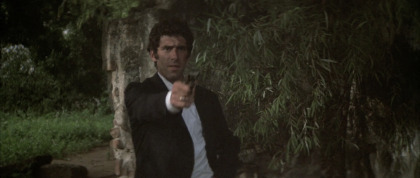
Marlowe: I have two friends in the world. One is a cat. The other is a murderer.
Is loyalty its own reward? Chandler’s book seems to argue it is, but Marlowe shooting his once-friend in the film argues something else. Grown and free of the romanticised prism Younger Me viewed Marlowe through, do I believe Chandler’s ending or Brackett’s?
The teenager who first read Chandler’s book would choose idealism: be true to your code, give your loyalty, those who turn on you will get what they deserve while you can keep the moral high ground. Even with grim answers in front of me, maybe I’d make like Marlowe, clinging stubbornly to loyalty disavowed by its recipient, or keeping myself preoccupied searching for answers and other mysteries.
While I want to hold to those ideals still, what are movies for if not to show us what we really want, wish-fulfilling our basest instincts? Watching now, I can’t help but savour that moment Marlowe tosses his cigarette, reaches into his waistband, and coolly shoots the man who treated his loyalty as commodity.
For #Noirvember, I wrote about the concept of loyalty in noir in general, and "The Long Goodbye" in particular. My upbringing was starkly black and white, everything strictly categorised as sin and acceptable, allowed and not.
0 notes